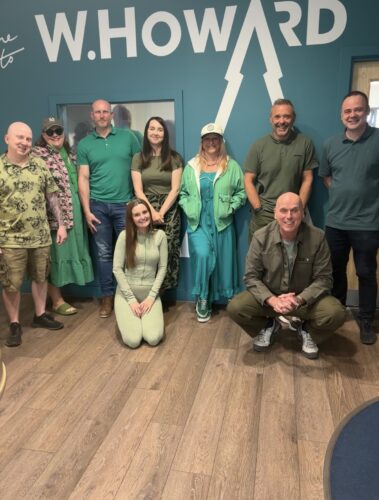Change the conversation around mental health
W.Howard joined much of the construction industry during October’s UK Construction Week to gather at Birmingham’s NEC Complex and discuss the latest trends affecting the industry. High on the agenda was Mental Health Awareness Day, which took place on Thursday 10 October.
Mental health – and the widespread need to improve it – has been a hot topic for much of 2019, after sobering statistics from the Office for National Statistics revealed the suicide rate among male construction workers is three times higher than the UK’s national average.
In fact suicide now accounts for more deaths among construction workers than falls – and when you consider how much effort the Health & Safety Executive devotes to campaigns and regulations that prevent falls from height, it’s clear that this is a serious issue that should not be ignored. Depression and anxiety have also overtaken musculoskeletal disorders as a common cause of missed work among the industry.
That’s why it was encouraging to see so much discussion centering on the issue across the whole of the UK Construction Week exhibition. The issue featured heavily during a diversity debate held at the event by the Builders’ Merchants Federation and Builders’ Merchants News, and there were numerous seminars and panel discussions on Workplace Wellbeing and Mental Health.
Exhibitors also got in on the act, with national mental wellbeing campaign Mind Your Head on hand to champion mental health to the wider industry. So, with everyone in agreement that more needs to be done, why are construction industry professionals struggling with stress and mental health issues?
There are many theories as to the cause, such as the often demanding work environment and long hours on site, while those who are sole traders often find themselves working alone for long days on site, and then doing the administration involved in running a business during evenings and weekends – leaving little time to recharge or spend with family.
So, what can we do to change the conversation?
Although a lot of progress has been made in recent years, mental health still carries a stigma that makes many people reluctant to talk about it. Research suggests that 95% of employees who take absence from work because of mental health issues lie about the reasons for the time off, as they are concerned about the impact that telling their line manager about their stress or mental health issues could be detrimental to them. As a consequence, because people don’t talk about mental health, it remains a largely unspoken, misunderstood and untackled problem that, if untreated, can shatter lives and families.
Know the signs
One of the biggest barriers is people being unaware of the early symptoms of poor mental health. With construction industry colleagues often spending hours together at work, they are best placed to pick up on the early signs that a colleague is struggling. These can include:
• Finding it difficult to make decisions
• Poor concentration
• Tearfulness
• Tiredness
• Lack of energy
• Low mood
• Avoiding social activities
• Talking less
• Worrying more
• Being easily distracted
• Aggression
• Irritability and short temper
• Drinking more.
Charity Mates in Mind, which was also on hand at UK Construction Week to offer advice, promotes positive mental health in the workplace and encourages people not to be afraid to ask for support or, if they see a colleague who may be struggling, to offer help or a friendly ear.
Many construction sectors also have lively and friendly social media networks where sole traders can reach out to fellow tradespeople even while working alone onsite.
Many mental health charities and organisations offer guidance to employers and employees on where to access support on these issues.
Further guidance can be found on social media through the hashtag #ItsOKNotToBeOK, or online at:
Mates in Mind: https://www.matesinmind.org/
Samaritans: https://www.samaritans.org/
Mental Health First Aid England: https://mhfaengland.org/
Mind: https://www.mind.org.uk
Mind Your Head: https://mindhead.co.uk



